Over 40? These foods might help you live longer according to science.
Looking for the secret to longevity? Incorporating these superfoods into your diet can help you live a long, healthy life, especially if you’re over 40. Here are the top foods that might help you live longer (according to science).

Aging. It’s happening to all of us yet few of us are truly comfortable with getting older. While no single food will add years to your life, eating a balanced, nutrient-dense diet filled with fiber, vitamins, and antioxidants, can help you stay on top of your health, and look and feel your best year after year.
Here are some science-based foods that can increase longevity and keep you looking (and feeling) youthful.
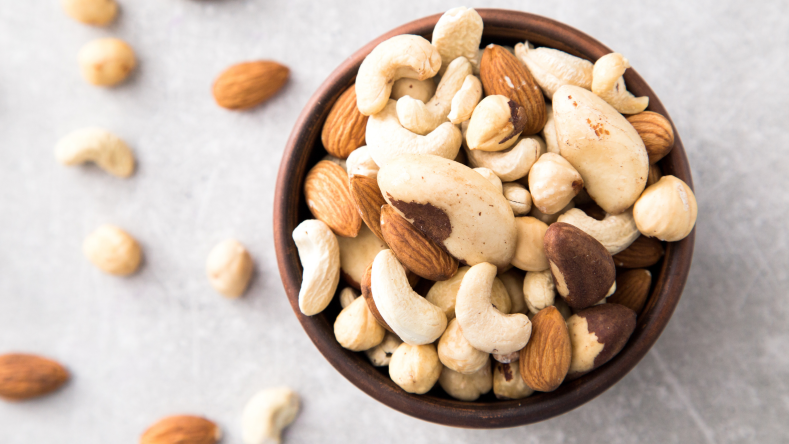
Nuts
Whether you enjoy cashews, walnuts, or almonds, these nutrient-dense morsels are packed with healthy fats, protein, and fiber, which promote heart health, satiety, and laxation among other things. Eating nuts regularly has been shown to reduce risk of obesity, hypertension, cardiovascular disease, and diabetes - which are all leading causes of death in adults in the United States [ 1 14
Different nuts offer different benefits so we recommend mixing things up. For example, almonds have been shown to improve glycemic control and insulin resistance, raise HDL (“good”) cholesterol, and support weight loss [ 1 8 1
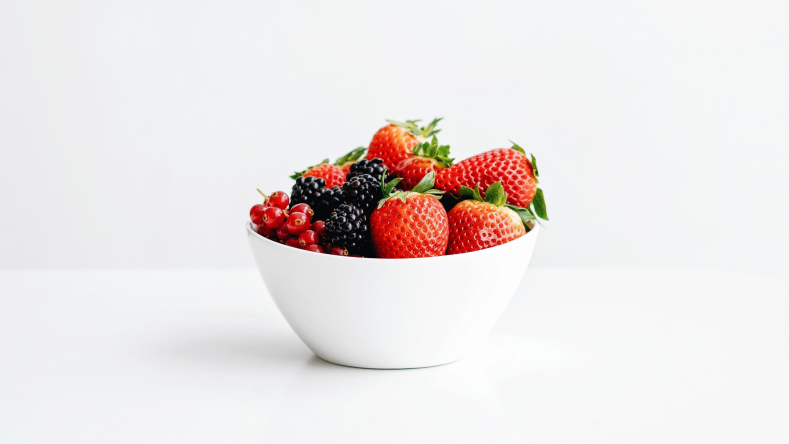
Berries
When it comes to berries, don’t be shy about eating the rainbow! Blueberries, strawberries, raspberries, blackberries, and cranberries are all low in calories and rich in antioxidants, vitamins, minerals, fiber, and other bioactive compounds that fight inflammation [ 2 3 17
More specifically, blueberries are beneficial for bone and heart health, contain high amounts of vitamin C and anthocyanins, and have one of the highest antioxidant capacities of all fruits [ 2 3 17
Strawberries have even more vitamin C than blueberries and help promote healthy skin, hair, and nails [ 2 3 17
Berries are also “berry” good for aging skin. Berries are rich in vitamin C which regulates collagen development and helps skin remain firm. Conversely, reduced collagen production can result in saggy skin and increased wrinkles [ 9 15 16
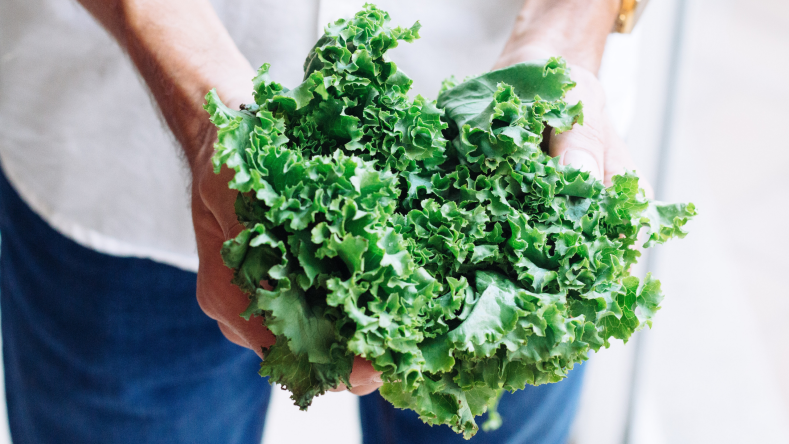
Cruciferous vegetables
Broccoli, cauliflower, brussels sprouts, kale, and cabbage are all members of the cruciferous vegetable family, a class of veggies that may help protect against various chronic diseases.
Sulforaphane is present in broccoli, cabbage, and cauliflower and has been shown to promote heart health and has antioxidant and antitumor properties [ 4 [18] 5
Go ahead and get cooking with cruciferous veggies to promote longevity! From soups and salads to stir-fries and smoothies, there are dozens of tasty options to include on your menu.

Whole grains
If you want to improve your lifespan, consider adding more whole grains to your diet! Studies have found a correlation between fiber consumption and all-cause mortality, as a high fiber diet is associated with lower concentrations of serum inflammatory biomarkers [ 18
For heart health benefits, aim to eat a total of 30-40 g of fiber-rich foods per day, 5-10 g of which should come from soluble fiber [ 11 12 13
Learn more about how to reduce your LDL cholesterol levels without medication
here
.
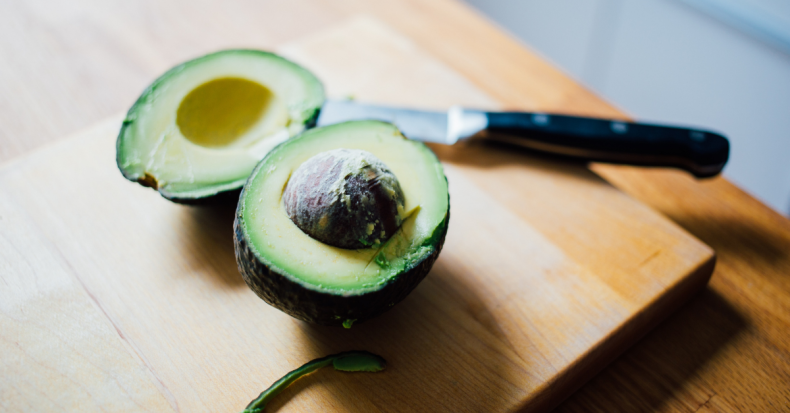
Avocados
Avocados are packed with fiber, monounsaturated fatty acids, vitamins K and E, potassium, and magnesium, all of which support overall health and wellbeing. Avocados are especially beneficial in supporting cardiovascular health, the leading cause of death in the US.
Studies have shown that eating avocados can help lower LDL (“bad”) cholesterol, improve glycemic control, and protect against DNA damage due to their high levels of monounsaturated fatty acids and antioxidants [ 6 6 19
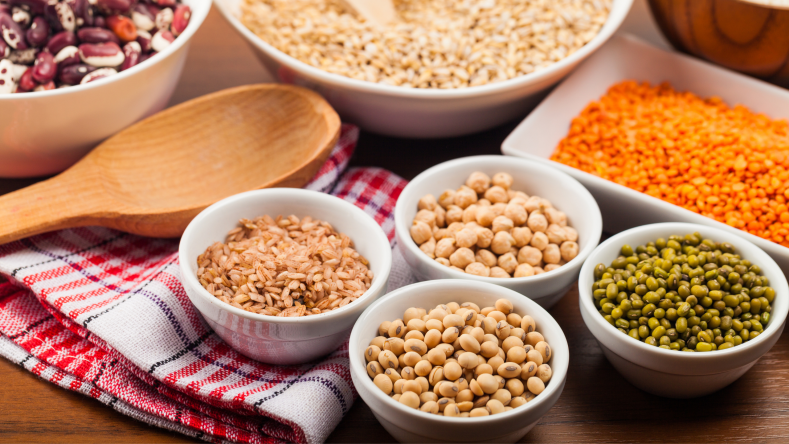
Beans
Beans and other legumes are nutrient powerhouses that are rich in soluble fiber and may help protect against colon cancer, diabetes, and heart disease (three of the leading killers worldwide) [ 20 7
Summary
As you age, it’s important to pay closer attention to nutrients that promote a long, healthful life. Eating a balanced, nutrient-dense diet filled with nuts, berries, cruciferous vegetables, whole grains, beans, and avocados, can help you offset your risk of chronic disease, manage weight, boost skin health, and prevent nutrient deficiencies, at age 40 and beyond.
Disclaimer: The text, images, videos, and other media on this page are provided for informational purposes only and are not intended to treat, diagnose, or replace personalized medical care.
Key Takeaways
While there is not yet a fountain of youth, eating a balanced, nutrient-dense diet filled with fiber, vitamins, and antioxidants is one of the best ways to live a longer, healthier life.
Eating nuts regularly has been shown to reduce the risk of multiple chronic diseases and negative health outcomes, including obesity, hypertension, cardiovascular disease, and diabetes [
1
].Berries are rich in antioxidants, vitamins, minerals, fiber, and other bioactive compounds that promote longevity, reduced inflammation, and improved collagen levels [
2
,9
].High intakes of cruciferous vegetables can reduce the risk of deadly cancers (such as colorectal and gastric) by 8-19% [
5
].Avocados can help lower LDL (“bad”) cholesterol, improve glycemic control, and protect against DNA damage due to their high levels of monounsaturated fatty acids and antioxidants [
6
].Beans and other legumes are nutrient powerhouses that are rich in soluble fiber, protecting you against colon cancer, diabetes, and heart disease (three of the leading killers worldwide) [
20
].
References
de Souza, R., Schincaglia, R. M., Pimentel, G. D., & Mota, J. F. (2017). Nuts and Human Health Outcomes: A Systematic Review. Nutrients, 9(12), 1311.
https://doi.org/10.3390/nu9121311
Skrovankova, S., Sumczynski, D., Mlcek, J., Jurikova, T., & Sochor, J. (2015). Bioactive Compounds and Antioxidant Activity in Different Types of Berries. International journal of molecular sciences, 16(10), 24673–24706.
https://doi.org/10.3390/ijms161024673
Miller, K., Feucht, W., & Schmid, M. (2019). Bioactive Compounds of Strawberry and Blueberry and Their Potential Health Effects Based on Human Intervention Studies: A Brief Overview. Nutrients, 11(7), 1510.
https://doi.org/10.3390/nu11071510
Ferreira, P., Rodrigues, L., de Alencar Carnib, L. P., de Lima Sousa, P. V., Nolasco Lugo, L. M., Nunes, N., do Nascimento Silva, J., da Silva Araûjo, L., & de Macêdo Gonçalves Frota, K. (2018). Cruciferous Vegetables as Antioxidative, Chemopreventive and Antineoplasic Functional Foods: Preclinical and Clinical Evidences of Sulforaphane Against Prostate Cancers. Current pharmaceutical design, 24(40), 4779–4793.
https://doi.org/10.2174/1381612825666190116124233
Johnson I. T. (2018). Cruciferous Vegetables and Risk of Cancers of the Gastrointestinal Tract. Molecular nutrition & food research, 62(18), e1701000.
https://doi.org/10.1002/mnfr.201701000
Dreher, M. L., & Davenport, A. J. (2013). Hass avocado composition and potential health effects. Critical reviews in food science and nutrition, 53(7), 738–750.
https://doi.org/10.1080/10408398.2011.556759
Mullins, A. P., & Arjmandi, B. H. (2021). Health Benefits of Plant-Based Nutrition: Focus on Beans in Cardiometabolic Diseases. Nutrients, 13(2), 519.
https://doi.org/10.3390/nu13020519
Pahlavani, N., Rostami, D., Ebrahimi, F., & Azizi-Soleiman, F. (2019, December 27). Nuts effects in chronic disease and relationship between walnuts and satiety: Review on the available evidence. Obesity Medicine.
https://www.sciencedirect.com/science/article/abs/pii/S2451847619300934
Ganceviciene, R., Liakou, A. I., Theodoridis, A., Makrantonaki, E., & Zouboulis, C. C. (2012). Skin anti-aging strategies. Dermato-endocrinology, 4(3), 308–319.
https://doi.org/10.4161/derm.22804
Abbaspour, N., Hurrell, R., & Kelishadi, R. (2014). Review on iron and its importance for human health. Journal of research in medical sciences : the official journal of Isfahan University of Medical Sciences, 19(2), 164–174.
https://www.ncbi.nlm.nih.gov/pmc/articles/PMC3999603/
Adding Soluble Fiber to Lower Your Cholesterol. National Lipid Association. (n.d.).
https://www.lipid.org/sites/default/files/adding_soluble_fiber_final_0.pdf
Surampudi, P., Enkhmaa, B., Anuurad, E., & Berglund, L. (2016). Lipid Lowering with Soluble Dietary Fiber. Current atherosclerosis reports, 18(12), 75.
https://doi.org/10.1007/s11883-016-0624-z
Pallazola, V. A., Davis, D. M., Whelton, S. P., Cardoso, R., Latina, J. M., Michos, E. D., Sarkar, S., Blumenthal, R. S., Arnett, D. K., Stone, N. J., & Welty, F. K. (2019). A Clinician's Guide to Healthy Eating for Cardiovascular Disease Prevention. Mayo Clinic proceedings. Innovations, quality & outcomes, 3(3), 251–267.
https://doi.org/10.1016/j.mayocpiqo.2019.05.001
Naghshi, S., Sadeghian, M., Nasiri, M., Mobarak, S., Asadi, M., & Sadeghi, O. (2021). Association of Total Nut, Tree Nut, Peanut, and Peanut Butter Consumption with Cancer Incidence and Mortality: A Comprehensive Systematic Review and Dose-Response Meta-Analysis of Observational Studies. Advances in nutrition (Bethesda, Md.), 12(3), 793–808.
https://doi.org/10.1093/advances/nmaa152
Cosgrove, M. C., Franco, O. H., Granger, S. P., Murray, P. G., & Mayes, A. E. (2007). Dietary nutrient intakes and skin-aging appearance among middle-aged American women. The American journal of clinical nutrition, 86(4), 1225–1231.
https://doi.org/10.1093/ajcn/86.4.1225
Purba, M. B., Kouris-Blazos, A., Wattanapenpaiboon, N., Lukito, W., Rothenberg, E. M., Steen, B. C., & Wahlqvist, M. L. (2001). Skin wrinkling: can food make a difference?. Journal of the American College of Nutrition, 20(1), 71–80.
https://doi.org/10.1080/07315724.2001.10719017
Miller, K., Feucht, W., & Schmid, M. (2019). Bioactive Compounds of Strawberry and Blueberry and Their Potential Health Effects Based on Human Intervention Studies: A Brief Overview. Nutrients, 11(7), 1510.
https://doi.org/10.3390/nu11071510
Veronese, N., Solmi, M., Caruso, M. G., Giannelli, G., Osella, A. R., Evangelou, E., Maggi, S., Fontana, L., Stubbs, B., & Tzoulaki, I. (2018, March 16). Dietary fiber and health outcomes: An umbrella review of systematic reviews and meta-analyses. OUP Academic.
https://academic.oup.com/ajcn/article/107/3/436/4939351
.Fulgoni, V. L., 3rd, Dreher, M., & Davenport, A. J. (2013). Avocado consumption is associated with better diet quality and nutrient intake, and lower metabolic syndrome risk in US adults: results from the National Health and Nutrition Examination Survey (NHANES) 2001-2008. Nutrition journal, 12, 1.
https://doi.org/10.1186/1475-2891-12-1
Fulgoni, V. L., 3rd, Dreher, M., & Davenport, A. J. (2013). Avocado consumption is associated with better diet quality and nutrient intake, and lower metabolic syndrome risk in US adults: results from the National Health and Nutrition Examination Survey (NHANES) 2001-2008. Nutrition journal, 12, 1.
https://doi.org/10.1186/1475-2891-12-1





